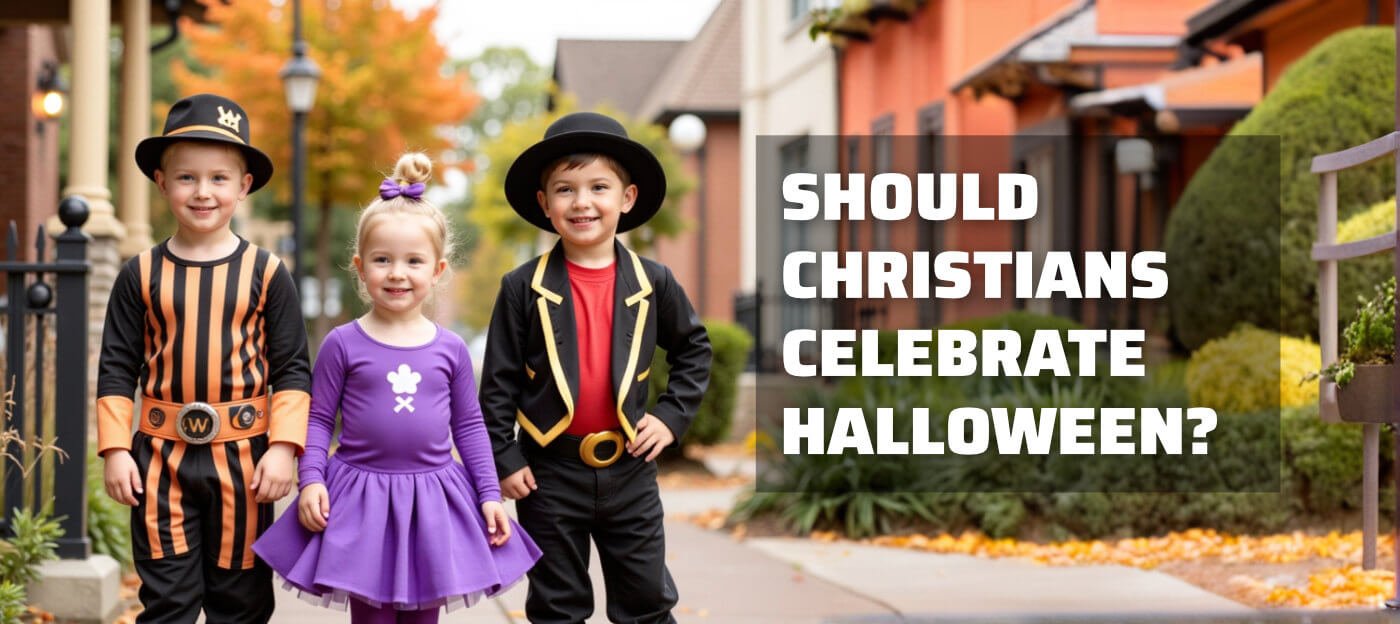Should Christians Celebrate Halloween?
Christians love arguing about Halloween. It happens every year. We could be arguing about civil things, like politics or vaccines—oh wait, we do that too.
Anyway, it’s probably worth looking a little closer at the issue of Halloween and seeing what bubbles to the surface.
Halloween has one of the longest and most fascinating evolutions of any holiday. Its roots trace back to the ancient Celtic festival of Samain (also spelled Samhain or Saman), which marked the end of the harvest season in the British Isles and the start of the new year on November 1.
This was a big deal for the Celts—not just a time for celebrating but also for sacrifices, both animal and human, as the Druids (Celtic priests) sought to appease spirits of destruction. The festival was also a major social event, marking the transition into the new year. People would light bonfires, dance, and wear grotesque masks to add to the excitement (Winkler & Winkler 206-08).
In the eighth century, Pope Gregory IV decided to adopt this festival for Christian purposes, repackaging it as All Saints' Day (All Hallows' Day)—a time to honor the saints and martyrs of the Church. The night before this new holiday became known as All Hallows' Eve, which eventually turned into what we know as—you guessed it—Halloween (Winkler & Winkler 207-08).
Because of this adoption, Christian influences quickly overtook the original holiday’s traditions, and many of the most common Halloween features we see today actually have strong ties to this Christian spirituality.
Take the jack-o’-lantern, for example. The “Jack” in the name comes from an Irish folktale about a trickster who managed to get himself banned from both Heaven and Hell. According to the story, the Devil gave him a lit coal, which Jack placed inside a hollowed-out turnip to light his way as he wandered the earth (Winkler & Winkler 214).
So, how should Christians approach Halloween today? Let’s dive into the arguments for and against celebrating it.
Why Christians Shouldn’t Participate in Halloween
Some Christians believe that Halloween is inherently wicked and that participating in it is spiritually compromising. Here are some of the most popular arguments in support of this view:
1. Halloween promotes disturbing imagery and behavior.
Many cite evidence like children playing dress-up as serial killers (Jason Voorhees, Freddy Kreuger, Vladimir Putin, etc.) and practitioners of magic (witches, wizards, Adele, etc), as well as the evidence previously mentioned regarding the holiday’s pagan origins.
Every year, parents spend good money so their kids can stomp around the neighborhood looking like they crawled out of a horror movie or a medieval demon-summoning circle.
And let’s not forget the adults who go all out—because nothing says “fun holiday” like your neighbor turning their yard into a crime scene with fake corpses, strobe lights, and eerie music that makes you question if you should call the police… or just admire their dedication.
To be fair, seeing a little kid running around with a fake bloody knife pretending to hack and slash their friends is a little… perturbing.
There’s something unsettling about an 8-year-old enthusiastically mimicking the mannerisms of a fictional mass murderer—especially when they do it too well. And while it’s all in good fun, there’s always that one kid who takes things a step too far, committing fully to their role as an undead ghoul and hissing at strangers like they’ve been possessed.
So maybe there’s some merit here. But do we need to throw the proverbial baby out with the Halloween punch? I may have lost the metaphor here…
2. Halloween’s origins are pagan.
Given its ties to Samhain and sacrifices, some argue that Halloween retains its pagan essence even today—just with fewer ritual bonfires and more overpriced plastic decorations from Spirit Halloween.
Instead of appeasing ancient spirits with offerings of crops and livestock, we now appease sugar-fueled children with king-sized candy bars and questionably homemade treats.
And while most celebrations today are more about haunted houses and pumpkin spice lattes than warding off vengeful ghosts, some still insist that dressing up as Fred from Scooby Doo is just one step away from summoning demons in your living room.
3. Halloween aligns the Church too closely with the world.
If churches engage with Halloween, do they risk blurring the lines between Christianity and secular culture?
After all, it’s a bit of a slippery slope—one minute, you’re hosting a harmless “Trunk-or-Treat” in the church parking lot, and the next, you’ve got deacons dressed as zombies and a fog machine rolling during Sunday service. Some argue that handing out candy from the church steps is basically like giving a friendly high-five to a holiday rooted in superstition and mischief.
I know that may be a little unfair—the church should be careful about wholesale embracing everything the culture embraces. Is Halloween one of those things?
4. Halloween makes light of serious spiritual matters.
The cartoonish portrayal of demons, ghosts, and the supernatural diminishes the seriousness with which Christians should treat spiritual matters. If demons and devils become “just costumes,” doesn’t that dull the reality of spiritual warfare?
It’s hard to take the forces of darkness seriously when you see a five-year-old in a red onesie with tiny horns demanding more candy. When Hollywood turns exorcisms into popcorn entertainment and people throw on fake fangs for a laugh, does it make the idea of real spiritual battles seem like just another campfire ghost story?
At some point, you have to wonder—if the devil is real, is he really walking around with a pitchfork and a goatee, or has he just found a really clever way to get people to stop believing in him entirely?
Why Christians Can Celebrate Halloween
To respond to the concerns of the holiday’s origins, it should be stated that the form and ceremony of any tradition which endures across time long enough will necessarily change, even to a degree that its current iteration may seem unrecognizable from its roots.
While these arguments all have a point to be made that we should seriously consider, that doesn’t mean we should swear off Halloween for good and make our kids stare longingly through windows while their friends get to play dress-up and collect free candy.
Here’s the thing—the underlying assumption in these arguments is that participating in Halloween means endorsing everything about it. And that’s simply not true.
Think about it: traditions change over time.
Take The Last Supper, for example. When Jesus and His disciples observed the Passover meal, it was a full meal with multiple elements.
Today, we commemorate it with a small piece of unleavened bread and a sip of juice (or wine, if you’re zesty like that). The form has changed, but the spirit of reflection remains intact, and that spirit is what gives the entire tradition its meaning and purpose.
You can even find evidence of this in Luke 22:19 which says, “And he took bread, and when he had given thanks, he broke it and gave it to them, saying, ‘This is my body, which is given for you. Do this in remembrance of me’” (emphasis added).
Compare that to Halloween. When kids today dress up as their favorite superheroes and go door-to-door for candy, no one is thinking about ancient Celtic sacrifices (probably)—because that’s simply not why we do it anymore.
Yes, letting your kid dress up as a fictional serial killer or Miley Cyrus is probably a bad idea. But Halloween isn’t just about those types of costumes—it offers a wide range of harmless fun that can even be used for positive, faith-based engagement.
Take a page from the Catholic Church’s book (no, not that book; this is just a metaphor): they repurposed Samhain to create All Saints’ Day.
Today, we can do something similar. Instead of shutting your doors and pretending the holiday doesn’t exist, why not hand out candy along with a short message about Jesus’s loving sacrifice to redeem all those who place their faith and trust in him?
It’s a chance to connect with your community and spread the Gospel rather than retreat from it. As Paul wrote in 1 Corinthians 9:22: “To the weak I became weak, that I might win the weak. I have become all things to all people, that by all means I might save some.”
Halloween presents an opportunity for us to do just that.
So, should Christians celebrate Halloween?
Ultimately, that’s up to you. If your conscience tells you to stay away, then by all means, don’t feel pressured.
But if you’re open to engaging with the holiday in a way that aligns with your faith, there’s room to do so while still honoring God. At the end of the day, it’s not about the holiday’s origins—it’s about how you choose to participate in it today.
Reference:
Winkler, Louis, and Carol Winkler. "THOUSANDS OF YEARS OF HALLOWEEN." New York Folklore Quarterly, vol. 26, no. 3, 1970, pp. 204. ProQuest, https://www.proquest.com/scholarly-journals/thousands-years-halloween/docview/1290827458/se-2.
This post was inspired by the Halloween episode of the Critical Levitical Podcast.


